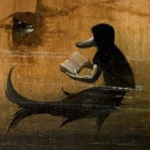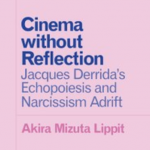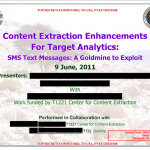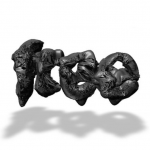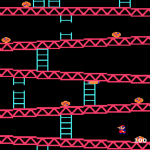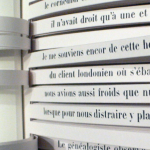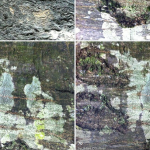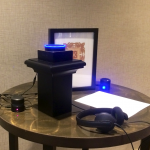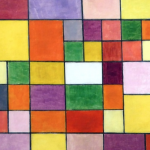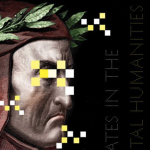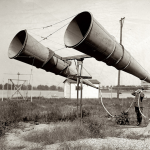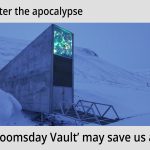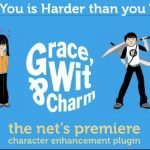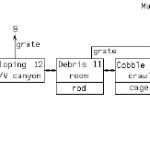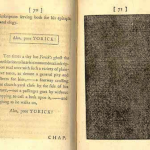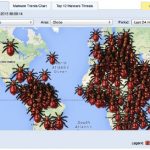2018
Repetition, gestural abstraction and depictions of noise; anabsence of narrative causation, a multiplicity of micro-narratives and opacity of material communications: The digital narrativity observed and created by Will Luers is equally applicable to the films of Stanley Kubrick or the paintings of Hieronymous Bosch - which implies a longer continuity (and less radical transformation?) than we might have expected. Indeed, Luers argues that "networks and nonlinear systems" might better be understood as "something deep in our brains," even as narrative may be regarded "as a necessary construct, but not the complete picture of reality."
If it's true, as Leiya Lee argues, that Akira Mizuta Lippit turns Derridean theory into a system, then it's a system grounded in ghostly presences (not least Derrida's own presence in film).
2017
"More is not necessarily more. Faster is not necessarily better. Big data is not necessarily better." In the effort to capture and make available data about people, digital humanities scholars must now weigh the decisions of what and what not to share. Geoffrey Rockwell and Bettina Berendt address the new ethical issues around “datafication” in an age of surveillance.
A review of Aesthetic**Animism, so vulnerably personal, and at the same time so pragmatically organized, that it might just suggest a possible future for scholarly and creative scholarship: a digital practice that (in Jhave's words) "distends selves towards collectivities that remind it of oblivion." For the moment, that inevitability is avoided by the book's receipt of the 2017 N. Katherine Hayles Award for Criticism of Electronic Literature.
"Even among the Greeks and Romans, the most advanced nations of antiquity, money reaches its full development, which is presupposed in modern bourgeois society, only in the period of disintegration."- Karl Marx, Introduction to A Contribution to the Critique of Political Economy
Though scholars of literature and the arts remain skeptical, Strunk explores some of the ways "videogames are making the transition into being objects worthy of artistic attention."
Reflecting on the genealogy and histories of "transgressive textualities" and text generators, Aquilina offers readings of texts by Swift, Dahl, Orwell, and Borges to consider the terms and issues involved in situating text generators as transgressive.
In her discussion of the textual, technical, and figurative characteristics of Graham Allen’s Holes (2017), Karhio “argues that [Allen's text] is not a landscape poem in the customary sense” and explores the ways in which the digital platforms deployed in the project’s creation and publication contribute to the signifying structures that “challenge the idea of landscape as symbolic representation of the inner world of the speaking subject.”
Reading practices have changed along the course of history. Before the ‘democratization’ of the written word - from Homer's Iliad to the medieval troubadours and to more recent public and private oral reading traditions -, reading has long been associated with listening. Today, in the age of algorithms and ‘smart’ interfaces, the sharing of language between humans and computational devices is increasingly ubiquitous and, with the standarization of artificial intelligence systems like Siri, Cortana, and Google Now, we are starting to speak and to listen to machines. In the field of digital literary creation, one example of aesthetic reflection on the questions raised by such networked ‘smart’ interfaces is John Cayley's The Listeners (2015), "a linguistic performance — transacted by visitors and Amazon’s voice-activated Artificial Intelligence and domestic robot, Alexa" (Cayley, 2015b). Through an analysis of The Listeners, articulated with Bernard Stiegler’s notion of the digital pharmakon, this paper aims to reflect on the encounter between literature and digital technologies. Three ideas will be highlighted: 1) the ways in which the technical, economic and political layers that constitute our digital devices pre-determine their usage (how they operate and are operated); 2) the automatic processing of language and orality as interfaces of mediation between humans and “smart” devices; 3) the literary implications of aurality and aurature.
In this review of Mark Seltzer’s The Official World, Ulmer reflects on the interdependence of “the official” and “the unofficial” in contemporary constructs of reality.
In a review that addresses (and exposes) the founding myth of the "digital humanities" (DH), formerly known as "humanities computing,” Roberto Simanowski and Luciana Gattass measure just how much the 99 articles collected by Mathew Gold and Lauren Klein have overturned "academic life as we know it."
Amazon’s Alexa, Apple’s Siri, Microsoft’s Cortana, and Google Now: How will our encounters with these intelligent personal assistants - robots we’ve invited into our homes to speak with and listen to us, who share this data with vectorialist institutions that monitor our networked transactions - alter both human language and our efforts to lead meaningful lives? In a wide-ranging, philosophical essay that exposes various myths of computation while presenting a candid assessment of the rapidly evolving culture of reading, poet John Cayley speculates that literature will be displaced by aurature. Listen up, readers: A major challenge in the programming era will be to develop linguistic aesthetic practices that intervene significantly and affectively in socio-ideological spaces thoroughly saturated with synthetic language that are largely controlled by commercial interests. The time for aesthetic experiments that disrupt the protocols of a still-nascent aurature is now.
This essay was reprinted in part for the Handbook on Electronic Literature (Bloomsbury 2018).
2016
An Introduction to the gathering.
In this introduction to her gathering on Digital and Natural Ecologies, Lisa Swanstrom pulls back from the tendency towards apocalyptic speculation that is commonplace in popular discourse of technology and nature. Instead, Swanstrom offers a more grounded discourse that addresses the impact of the digital on the natural.
Bernard Stiegler's "Relational Ecology and the Digital Pharmakon."
2015
In Pasts and Futures of Netprov, Rob Wittig articlates a theory for Networked Improv Narratives, or "Netprovs." Wittig, an innovator in this novel form, situates netprov at the interesection of literature, drama, mass media, games, and new media. Transcribed from a presentation given at the Electronic Literature Organization conference in Morgantown, WV, Wittig explores a number of antecedents to the form, documents current exemplars of this practice, and invites readers to create their own networked improvisations.
Jerz and Thomas identify our fascination with natural cave spaces, and then chart that fascination as it descends into digital realms, all in order to illustrate the importance of "the cave" as a metaphor for how we interact with our environment.
In the course of examining a number of key concepts in New Materialism, eco-criticism, and feminist philosophy, Melanie Doherty delves into Jamie Skye Bianco's digitally generated "postnature writing." Doherty's rich knowledge of contemporary ecofeminist debates helps to contextualize Bianco's hybrid performance-based works that draw upon a database of philosophical texts and landscapes, like the Salton Sea and Dead Horse Bay, that have been marred by histories of human misuse.
In this keynote address to the 2014 Electronic Literature Organization Conference, Illya Szilak highlights the power of "minor forms" in digital literature. Through a wide-ranging survey of works, Szilak identifies the tendency for "failure" in electronic literature as its most powerful feature: its capacity to deterritorialize the parameters of discourse and expand the potential of subjectivity in the process.
In Sublime Latency and Viral Premediation, Kim Knight addresses the “eco-poetics of the viral” across the biological, social, and digital. Through an analysis of the spread of digital infection, the dynamics of anti-virus software, and digital arts practices, Knight discusses a poetics of fear and desire that is instrumental to the transmission of this virtual pathology. Knight continues, drawing parallels with crowdsourced epidemiology apps that track illness and promote physical health, and makes a powerful case for what Richard Grusin has called the “premediation” of anxiety as a strategy for managing affect in the 21st Century.
